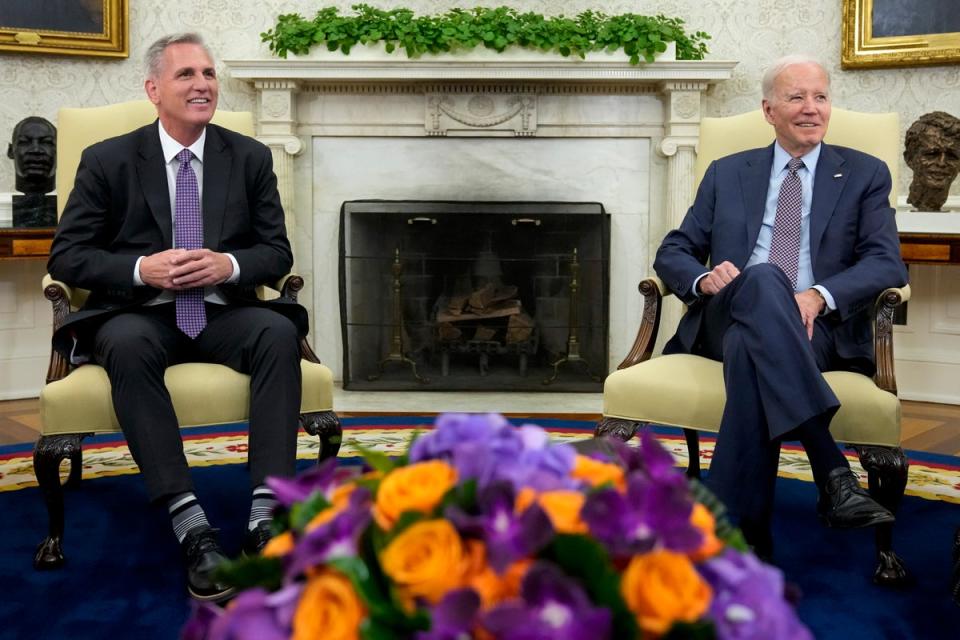Debt ceiling deal reached between Biden and McCarthy

President Joe Biden and House speaker Kevin McCarthy have reached a tentative agreement to avert a catastrophic and unprecedented default on America’s sovereign debt, ending a month-long standoff that threatened the US and global economies.
The White House said Mr Biden and Mr McCarthy spoke by phone for roughly 90 minutes late Saturday. The president also spoke with Democratic congressional leaders as talks between the White House and the Republicans who control the House of Representatives entered final stages after days of back-and-forth over GOP demands to add work requirements for food assistance and other programmes meant to help lower-income Americans.
One source familiar with the matter described the president and the House speaker as having come to an “agreement in principle” that would limit federal spending while raising the nation’s statutory debt limit by an amount large enough to keep the issue off the table through the November 2024 general election.
News of the spending accord between the president and Congressional Republicans comes just days before the so-called “X Date” laid out by Treasury secretary Janet Yellen – the date on which the US would no longer be able to issue new securities to raise funds needed to pay for programmes already authorised by Congress.
The framework for the agreement between Mr McCarthy and Mr Biden must still be converted into legislative language and passed by both the House and Senate before it can head to the president’s desk to be signed into law. According to Ms Yellen, that process would have to be complete by 5 June to avoid a default.
Additionally, members are not expected to return to work from the Memorial Day weekend before Tuesday, at the earliest, and McCarthy has promised his conference that he will abide by a House rule requiring him to publish the text of any legislation 72 hours before it is voted on.
That process could be completed quickly enough for both chambers to debate and vote on the legislation by the end of next week. But one top House negotiator, North Carolina representative Patrick McHenry, told reporters on Saturday that “big thorny issues remain” that must be ironed out between the president and the speaker.
The bill that is drafted using the terms of the tentative agreement must also garner support from a majority of both chambers. In the GOP-led House, that could be no small task for either Mr McCarthy or House minority leader Hakeem Jeffries.
As negotiations between the White House and Mr McCarthy’s team continued into the weekend, many of the most conservative members of the House Republican Conference suggested they would not support any bill that fell short of the sweeping cuts laid out in the “Limit, Save, Grow Act” approved by the House earlier this year.
Similarly, many of the most progressive House Democrats have pledged not to support any bill that includes spending cuts or adds work requirements for social programmes.
While there is precedent for a Republican House speaker to cobble together a centrist majority of Republicans and Democrats to support such a must-pass bill, it would leave Mr McCarthy facing peril from his rightward flank.
When the California Republican was elected House speaker after a record 15 ballots in January, a condition of support from the far-right House Freedom Caucus was that he agree to amend House rules to allow any one member to make a procedural motion that would trigger a vote to remove him from his post.
That parliamentary procedure – known as a “motion to vacate the chair” – has hung over Mr McCarthy like a Sword of Damocles since he assumed the speaker’s role.
While some moderate Democrats have quietly suggested they would lend him enough support to survive a far-right revolt, it’s not clear if those pledges will be fulfilled if Democrats aren’t satisfied with the agreement he has made with Mr Biden.
Anger over a spending deal between a Republican House speaker and a Democratic president has taken out a GOP House speaker before.
In 2015, then-speaker John Boehner announced he would resign in the face of right-wing outrage over a spending agreement he struck with then-president Barack Obama to avert a government shutdown.
With additional reporting by agencies

 Yahoo Sport
Yahoo Sport 





































